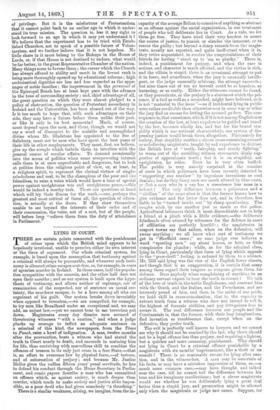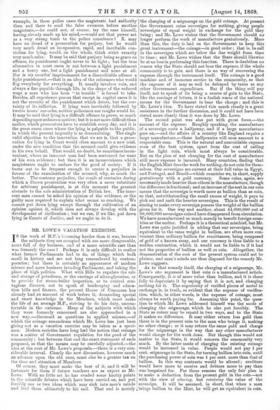LYING IN COURT.
THERE are certain points connected with the punishment of crime upon which the British mind appears to be hopelessly irrational, unable to perceive either its own interest or the force of argument. Our whole criminal system, for example, is based upon the assumption that testimony against a criminal will always be procurable, and whenever such testi- mony is silenced crime escapes scot-free, as, for example, in cases of agrarian murder in Ireland. In those cases, half the popula- tion sympathize with the assassin, and the other half dare not open their mouths ; and as our system is built upon the hypo- thesis of testimony, and allows neither of espionage, nor of examination of the suspected, nor of sentence on moral cer- tainty, the murderer escapes, to be a hero among all who are cognizant of his guilt. Our system breaks down invariably when opposed to terrorism,—we are compelled, for example, to try men like Broadhead under an exceptional and, we may add, an unjust law,—yet we cannot bear to see terrorism put down. Magistrates every day dismiss men accused of threatening witnesses " with a caution," and when a judge plucks up courage to inflict an adequate sentence on a criminal of this kind, the newspapers, from the Times to Punch, raise a howl of indignation. A man, twelve months after the provocation, beats a witness who had stated the truth in Court nearly to death, and succeeds in maiming him for life, thus contriving with marvellous skill to combine the offences of treason in its only just sense in a free State,—that is, an effort to overcome law by physical force,—of torture, and of subornation of perjury ; and because Mr. Justice Mellor gives the ruffian fifteen years' penal servitude, he has to defend his conduct through the Home Secretary in Parlia- ment, and comic papers describe a man who has committed an offence which, as against society, is much deeper than murder, which tends to make society and justice alike impos- sible, as a poor devil who had given somebody "a threshing." There is a similar weakness, arising, we imagine, from the in- capacity of the average Briton to conceive of anything so abstract as an offence against the social organization, in our treatment of people who tell deliberate lies in Court. As a rule, we let them go free. They have tried their very hardest to arrest the course of justice, to punish or slander the innocent, or to rescue the guilty ; but beyond a sharp remark from the magis- trate, usually not reported, and quite ineffectual when it is, they retire unpunished, to receive the congratulations of their friends for having " stood up to 'em so plucky." There is, indeed, a punishment for perjury, and when the case is serious, and character is much affected, and the victim is rich, and the villain is stupid, there is an occasional attempt to put it in force, and sometimes, when the jury is unusually intelli- gent, or the judge unusually arbitrary, the attempt succeeds ; but nine times out of ten no lawsuit could be so hopeless, so harassing, or so costly. Either the witnesses cannot be found, or they prevaricate, or the perjury is a statement which the pri- soner, if a fool as well as a scoundrel, might have believed, or it is not "material to the issue "—as if incidental lying in public were rather creditable than otherwise—or in some way or other the jury find an excuse for letting the accused go free. The con- sequence is, that conscience, which, if it is not among Englishmen the creation of the law, at least requires to be guided and toned by the law, becomes wholly lax, and but for the brutal stu- pidity which is our national characteristic, our system of dis- pensing justice would break down altogether. Fortunately for society, that stupidity enables a clever cross-examining counsel or unbelieving magistrate, taught by sad experience to distrust the British love of " truth, fair-play, and sturdy fighting," to worm out of the unwilling witness statements dimly sug- gestive of approximate truth ; but it is on stupidity, not uprightness, he relies. Even ho is very often baffled. The public is very naïvely surprised at the number of cases in which policemen have been recently detected in " supporting one another " by ingenious inventions or cool denials ; but do they fancy men are much altered by blue coats, or that a man who in a cap has a conscience has none in a helmet ? The only difference between a policeman and a " civilian " of the same elms is that the former knows how to give evidence and the latter does not, and is, therefore, less liable to be " turned inside out " by sharp questioning. The roughs stick by one another just as much as the police. Agricultural labourers think it most discreditable not to help a friend at a pinch with a little evidence,—the deliberate falsehoods often uttered by witnesses for the defence in cases of affiliation are perfectly horrible ; the magistrates in seaport towns say that sailors, when on the defensive, will swear anything ; we all know what sort of testimony we get in " Sheffield cases ;" no sane judge ever believes a word "sporting men" say about horses, or bets, or little conspiracies for plunder ; while, as for the criminal class, lying in Court, particularly that form of lying which appeals to the "poor-devil" feeling, is reduced by them to a science. Mr. Mill said lying was the vice of the English lower classes, and though that is an exaggeration, it is certain that many among them regard their tongues as weapons given them for defence. Does anybody when complaining of anything to an ordinary servant expect to hear the truth in excuse ? We talk of the love of truth in the noble Englishman, and contrast him with the Greek, and the Italian, and the Frenchman, and are intensely proud of him, and then, in the midst of our pride, we hold skill in cross-examination, that is, the capacity to extract truth from a witness who does not intend to tell it, the highest of forensic abilities, and pay 500-guinea fees to secure it. The real difference between our people and the Continentals is, that the former, with their lazy imaginations, find invention so troublesome that., except when on the defensive, they prefer truth.
The evil is perfectly well known to lawyers, and we cannot see why it should not be reached by the law, why there should not be a legal offence less than perjury, and requiring a lighter, but a quicker and more summary, punishment. Why should not lying in Court be a criminal offence punishable by a magistrate with six months' imprisonment, like a theft or an assault ? There is no reasonable excuse for lying after cau- tion, and in the witness-box. A man may be uncertain of his facts, or may have a mistaken impression of them, or,—a much more common case,—may have thought and talked over the case, till he cannot tell the difference between his true and his imaginary recollections ; but a clever magistrate would see whether he was deliberately lying a great deal better than a stupid jury, and prosecution might be allowed only when the magistrate or judge saw cause. Suppose, for example, in these police cases the magistrate had authority then and there to send the false swearers before another magistrate,—he could not, of course, try the case himself, having already made up his mind,—would not that power act as a very strong tonic to the police conscience X. may have no dread of a prosecution for perjury, but he would very much dread an inexpensive, rapid, and inevitable con- viction for lying, would, on the whole, think strict veracity very much safer. It may be said that purjury being so grave an offence, its punishment ought never to be light ; but the true alternative in most cases is not between a light punishment and a heavy one, but a light punishment and none at all. Nor is six months' imprisonment for a discreditable offence a light punishment,—that is an idea of the reformers who would flog everybody for everything. It usually involves ruin, and always a fine payable through life, in the shape of the reduced wage a man who has been " in trouble " is forced to take. Besides, all experience proves that except in capital cases it is not the severity of the punishment which deters, but the cer- tainty of its infliction. If lying were inevitably followed by twelve hours' ear-ache, neither policemen nor roughs would lie. It may be said that lying is a difficult offence to prove, so much depending upon unknown motive; but it is not more difficult than malice, which prosecutors have to establish every day, and it is the gross cases, cases where the lying is palpable to the public, in which the present impunity is so demoralizing. The single valid objection to the innovation that we see is, that a prose- cution for lying in Court would often amount to a new trial, under the new condition that the accused could give evidence in his own behalf. That would, no doubt, be sometimes incon- venient, where an innocent man had been sentenced for want of his own evidence ; but then it is an inconvenience which magistrates ought to endure for the good of society. If it turns out to be frequent enough to create a prejudice in favour of the examination of the accused, why, so much the better. The contrary prejudice, the result of centuries during which a Crown prosecution was very often a mere substitute for arbitrary punishment, is at this moment the greatest obstacle to the safe administration of British law. The inno- cent man cannot be asked his opinion of the evidence, or the guilty man required to explain what seems so crushing. We cannot put down lying except through the cultivation of an opinion against it, which does not always develop with the development of civilization ; but we can, if we like, put down lying in Courts of Justice, and we ought to do it.































 Previous page
Previous page